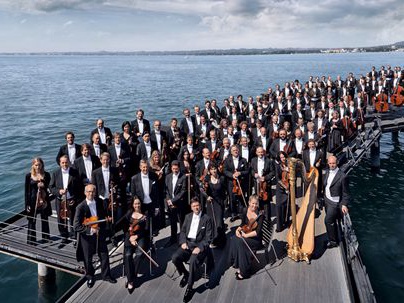
Wiener Symphoniker Concert
Venue: National Centre for the Performing Arts - Concert Hall
Dates: April 06-07, 2017
Conductor
Philippe Jordan
Currently Musical Director of the Opera National de Paris and Chief Conductor of the Wiener Symphoniker, Philippe Jordan has established himself as a gifted and exciting conductor of his generation.
Philippe Jordan’s musical education began with piano lessons at the age of six. At the age of eight, he joined the Zurich Sängerknaben and he was 11 when he began studying violin. At 16, he entered the Zurich Conservatory where he obtained his diploma of piano teacher with honors. He studied theory and composition with the Swiss composer Hans Ulrich Lehmann and continued his piano studies with Karl Engel. At the same time, he worked as assistant to Maestro Jeffrey Tate on Wagner’s Ring Cycle at the Châtelet in Paris. He continues to appear occasionally as pianist in recitals and chamber music concerts.
His career began in 1994/95 as Kapellmeister of the Ulm Stadttheater. From 1998-2001, he was assistant to Daniel Barenboim at the Deutsche Staatsoper Unter den Linden in Berlin. From 2001-2004, he held the position of Chief Conductor of the Graz Opera and Graz Philharmonic Orchestra. During this period, he made his debut at several international opera houses and festivals, including the Houston Grand Opera, the Glyndebourne Festival, the Aix-en-Provence Festival, the Metropolitan Opera New York, the Royal Opera House Covent Garden, among others. From 2006-2010, he was Principal Guest Conductor of the Berlin Staatsoper Unter den Linden.
Philippe Jordan’s orchestral engagements have included world-renowned orchestras, such as the Berlin Philharmonic, the Vienna Philharmonic, Vienna RSO, Orchestre Philharmonique de Radio France, Philharmonia Orchestra London, among others. In North America, he has appeared with the Seattle, St. Louis, Dallas, Detroit, Chicago, Cleveland, Philadelphia, Washington, Minnesota, Montreal, New York and San Francisco Orchestras.
In the 2015-16 season he conducted among others a full cycle of the Beethoven piano concertos (solist: Pierre-Laurent Aimard) with the Wiener Symphoniker and a new production of Moses and Aronat the Opera National de Paris.
Philippe Jordan has recorded Carmen (Glyndebourne Festival), Werther (Wiener Staatsoper), Doktor Faust (Zurich Opera) and Salomé (Covent Garden), Tannhäuser (Baden-Baden), Le Nozze di Figaro (Opéra National de Paris) and Pelléas et Mélisande (Opéra National de Paris), which received the “CHOC de l’année” prize for Classica in DVD format.
He has also recorded for Naïve the complete Beethoven Piano concertos with François-Frédéric Guy and the Orchestre Philharmonique de Radio France as well as Strauss’ Alpensinfonie with the Opéra National de Paris Orchestra, which was awarded the “CHOC de l’année - Classica”. The Sacre du Printemps CD that he also recorded received the “CHOC” prize for the Musical World. Mr. Jordan recently released two albums, one with a recording of the Verdi’s Requiem, the other with symphonic excerpts from Wagner’s Ring. Both of these were performed with the orchestra of the Opéra National de Paris and were released through the label Erato. His last recording with the orchestra of the Opéra National de Paris, Ravel’s Daphnis and Chloe and La Valse was released in May 2015. With the Wiener Symphoniker he has so far recorded a CD of Tchaikovsky’s Pathétique Symphony (released September 2014) followed by a recording of Schubert’s 7th and 8th Symphony that was released in August 2015.
PresenterWiener Symphoniker
As Vienna’s cultural ambassador and concert orchestra, the Wiener Symphoniker handles the lion’s share of symphonic activity that makes up the musical life of the Austrian capital. The orchestra’s activities centre around innovative projects that are associated with the purposeful cultivation of important Viennese musical traditions.
In October 1900, the newly formed Wiener Concertverein, as it was called back then, gave its first public performance at the Vienna Musikverein with Ferdinand Löwe on the podium. The Wiener Symphoniker has premiered works that are now undisputed staples of the orchestral repertoire, including Anton Bruckner’s Ninth Symphony, Arnold Schönberg’s Gurre Lieder, Maurice Ravel’s Piano Concerto for the Left Hand, and Franz Schmidt’s The Book with Seven Seals. Over the course of its history, conducting greats like Bruno Walter, Richard Strauss, Wilhelm Furtwängler, Oswald Kabasta, George Szell and Hans Knappertsbusch have left an indelible mark on the orchestra. In later decades, Herbert von Karajan (1950 –1960) and Wolfgang Sawallisch (1960–1970) were the Chief Conductors who moulded the sound of the orchestra most significantly. After the brief return of Josef Krips, the position of Chief Conductor was filled by Carlo Maria Giulini and Gennadij Roshdestvensky. Georges Prêtre was Chief Conductor from 1986 to 1991. Rafael Frühbeck de Burgos, Vladimir Fedoseyev and Fabio Luisi then assumed leadership of the orchestra.
Leading lights who have enjoyed success as guests on the podium of the Wiener Symphoniker include Leonard Bernstein, Lorin Maazel, Zubin Mehta, Claudio Abbado and Sergiu Celibidache.
The Swiss conductor Philippe Jordan took up the position of Music Director at the beginning of the 2014-15 season, leading the Wiener Symphoniker into a new era. In the process, the orchestra focuses especially on seasonal involvement with major composers, contemporary music, collaboration with Artists in Residence, and spirited activity in music education.
The Wiener Symphoniker appears in more than 150 concerts and operatic performances per season, the vast majority of which take place in Vienna’s well-known concert venues, the Musikverein and the Konzerthaus. Added to that is a busy and extensive touring schedule. Since 1946, the Wiener Symphoniker has been the Orchestra in Residence at the Bregenz Festival, where it also plays the majority of operatic and symphonic performances. The orchestra took on a new challenge at the beginning of 2006: That’s when the Theater an der Wien became a functioning opera house again, and the orchestra has been responsible for a significant number of productions ever since.[source:National Centre for the Performing Arts]



